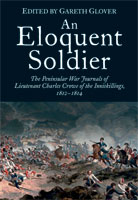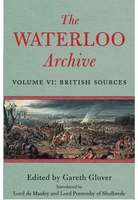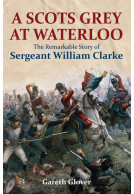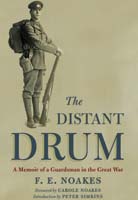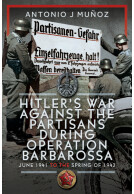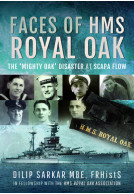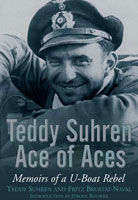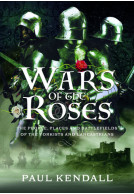An Eloquent Soldier (Hardback)
The Peninsular War Journals of Lieutenant Charles Crowe of the Inniskillings, 1812–14
(click here for international delivery rates)
Need a currency converter? Check XE.com for live rates
| Other formats available - Buy the Hardback and get the eBook for free! | Price |
|---|---|
| An Eloquent Soldier ePub (7.1 MB) Add to Basket | £6.99 |
Lieutenant Charles Crowe's journal of the 27th Foot (Inniskillings) of the final campaign of Wellington's army is
a rare work for many reasons. It is, perhaps surprisingly, the first memoir about this campaign from this famous regiment to be published.
Crowe wrote a daily journal at the time, which practically guarantees the authenticity and accuracy of his account. But what makes it special is that Crowe was extremely well read and was an accomplished writer, so that when he wrote up his journal in 1842–3, he was able to embellish his basic journal, describing his thoughts, actions and words in beautiful detail. He thus turned his record of his short army career into a masterpiece of journalism.
Clearly written purely for the enjoyment of his family, Crowe does not pull his punches: he censures officers both junior and senior; he talks openly of the ravages of war, and the pillaging, raping and looting; the horrors of war, describing the deaths and horrific wounds of many in lurid detail, the cowardice and stupidity; and he also describes the mundane in detail – nothing is passed over.
Crowe is an invaluable source to military historians
on many levels, and his journal will stand proudly – deservedly – in the pantheon of great military memoirs.
Twenty-seven-year-old Charles Crowe is the Eloquent soldier. Skilfully edited by Gareth Glover, The Peninsular War Journals skilfully begin with Crowe landing at Lisbon in the late November 1812, to commence his long march north to join the 27th a month later.
The British Army Review
Crowe gives the reader a detailed picture of life on the march. For example, he describes 'a small half round kettle' that was handed out to the men to be carried behind the knapsack, a strap holding down the lid, so that cooked rations could be carried securely and free from dust and flies.
While this may seem minor observation it is typical of the attention to detail rarely referred to in most other published narratives of this period, which makes Crowe's 'Journals' of real value.
Crowe's description of the scene is a delight to read. Indeed, the rest of the material is good and justifies the adjective 'eloquent'. His original notes were only properly transcribed between 1842 and 1851, four years before his death. Yet despite the occasional errors in deciphering these notes Crowe is very accurate when naming the majority of villages they marched through during Wellington's rapid outflanking thrust east and then north-east towards Victoria.
Crowe's description of the action at Victoria is particularly interesting. He describes it as 'the longest day I experienced'.
Crowe's campaign was cut short in mid August when he was sent from the front to Victoria with money for wounded officers of the brigade contracting en route what he thought was sunstroke, which put him out of action for five months with fevers and headaches.
From the symptoms he described, Brucellosis (caught from drinking unpasteurized milk or poorly cooked goat) would have been the cause of this non-specific illness. At the time, the medical fraternity was unable to diagnose his complaint or treat it appropriately so they suspected him from malingering instead.
Once recovered, Crowe rejoined his regiment on 27th February 1814 at Orthez before it returned to the coast to collect new clothing.
By the end of March the Inniskillings has tramped east to Toulouse, where the ensuing battle took place on 10 April which Crowe details in his journal.
Later chapters briefly describe the dispersal of the Allied forces, Crowe's march to Bordeaux to embark for home, and his subsequent career. He was placed on half-pay in 1817, and his 'recollections' come to a close in 1822.
My reaction to this book is almost identical to the last paragraph in Gareth Glover's Foreword where he states that after several decades studying the period, 'Charles Crowe has still managed to educate me and taught me much that I did not know.
The extensive footnotes add immeasurably to the value of the material.
About Gareth Glover
Gareth Glover is a former Royal Navy officer and military historian who has made a special study of the Napoleonic Wars for the last thirty years. In addition to writing many articles on aspects of the subject in magazines and journals, his books include From Corunna to Waterloo, Eyewitness to the Peninsular War and the Battle of Waterloo, An Eloquent Soldier, fourteen volumes of The Waterloo Archive, Waterloo: Myth and Reality, The Forgotten War Against Napoleon: Conflict in the Mediterranean 1793-1815, The Two Battles of Copenhagen 1801 and 1807: Britain and Denmark in the Napoleonic Wars and Marching, Fighting, Dying: Experiences of Soldiers in the Peninsular War.







